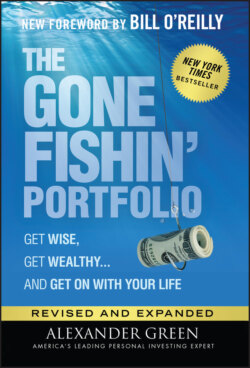Читать книгу The Gone Fishin' Portfolio - Alexander Henry Green - Страница 23
На сайте Литреса книга снята с продажи.
THE RIGHT MINDSET
ОглавлениеIf you want to do something about economic inequality in this country—especially as it relates to your own financial circumstances, the important thing is your mindset. How you handle your time, choices and money matters.
Too many people in today's society have little understanding of how wealth is created—how more than 11 million American households generated a seven-figure net worth.
These people optimized their education and marketable skills, maximized their incomes, lived within their means, saved regularly, invested smartly and let their money compound over a long period of time, generally decades.
Most of us work, of course, but many who could save don't.
Those who are physically or mentally disabled and cannot work deserve our sympathy and compassion. I support social welfare programs for the truly needy. But that cannot possibly describe most of us when the U.S. median household income was $68,703 in 2019.
Let's imagine that you and I are two hypothetical families earning exactly this median income—and watch how quickly our choices and habits change our economic circumstances.
I'm a spendthrift. I blow every dollar I make each year. You, on the other hand, are a little bit more prudent. You spend almost everything you make, but regularly save 4% of your monthly income—$229 a month—through a Roth IRA.
Let's further stipulate that you invest that money in a plain-vanilla S&P 500 index fund that generates nothing more or less than its average long-term return of 10%.
After the first decade, with dividends reinvested, you have $47,300. I have zero. As you can see, things are already unequal. In 20 years, you have $175,345. (Finding $400 for an emergency is not a problem.) I have nothing. In 30 years, you have $521,966. I still have nada. And in less than 38 years, your $229 a month has turned into more than a million dollars.
Plus, it's tax-free. (Let's recall that you were smart enough to invest in a Roth IRA where distributions are tax-exempt.)
Some readers may not have 30 or 40 years to save and invest, of course. In that case, they need to save more or earn a higher rate of return … or both.
Say, for example, rather than 4%, you saved 10% of that median income each month—or $572—and invested in the higher-returning Russell 2000 index of small cap stocks, which has returned 12% annually. You would have $132,898 in 10 years and more than a half-million dollars in 20 years. You would be a millionaire in less than 25 years.
Amp up the savings or the returns and you'll be there quicker still. In short, it's your behavior rather than luck, fortune or “the breaks” that ultimately determines your financial well-being.
This is how millions of ordinary Americans became millionaires. They weren't just lucky. They didn't inherit it. They had a plan. They stuck to it. And they reaped the rewards.
With time and discipline, you can, too. But first you need to understand how major trends underway are creating incredible progress for most of us.
